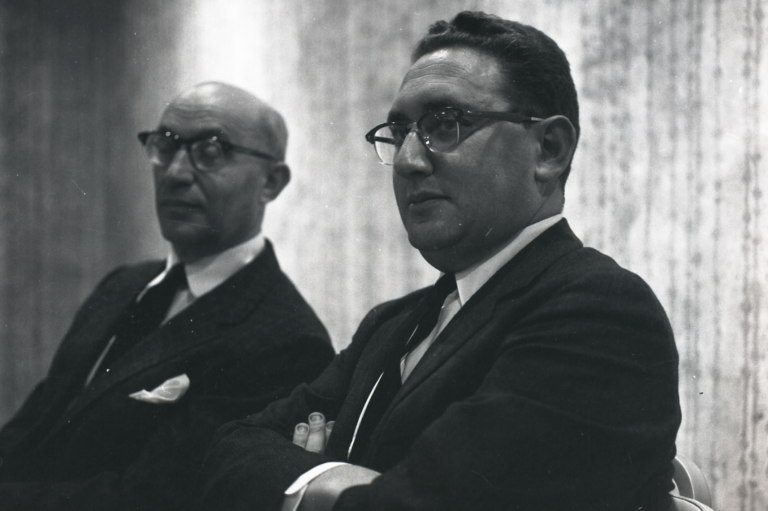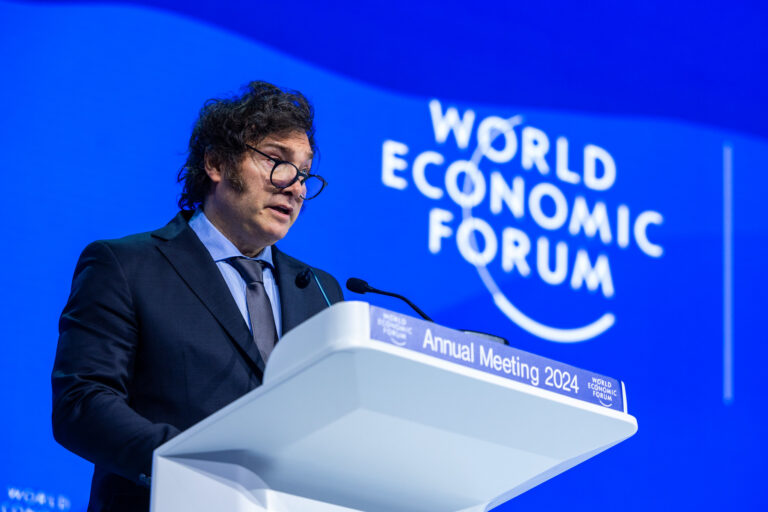Health Minister Flavier is a short four and a half feet or so tall — but he talks BIG, and he mouths SMART — proud of what he’s put over on his people. Humor, he says is the way to succeed. After all, the big guys wouldn’t look so wonderful beating up on such a little fellow as Health Minister Flavier! And as he talks, a new understanding of the scope, methods and attitudes of the population control folk begins to take on a new meaning, particularly for the Philippine citizens who traveled many miles to Cairo to hear what he had to say.
Now it’s a known fact that the United Nations utilizes non-governmental agencies (NGOs) to carry out its agenda at the community level. This method is, in fact, sometimes viewed as an expression of democracy at work. However, as with the United Nations itself, these organizations can become ‘unelected’ rulers’ carrying out externally directed policy at the local level. NGOs are often funded by sources external to the countries themselves and mask the influence of those with vested interests in the outcome of their activities, including members of governmental bureaucracies such as Dr. Juan M. Flavier.
During the United Nations’ International Conference on Population and Development (ICPD) held in Cairo in September 1994, citizens of various countries exhibited sufficient interest in the outcome to attend and note the behaviors, activities and intentions of their government representatives. And so it was that Philippine citizens can now freely circulate a video of the ‘Little Man’ as he hit the big time in the Cairo arena. This article presents direct quotations from a workshop for NGOs run by Dr. Flavier, at the NGO Forum in Cairo. Americans will be interested to learn that Dr. Flavier was trained at The Johns Hopkins University in Baltimore, Maryland, undoubtedly with the generous assistance of American tax payers. The Johns Hopkins University (JHU) has benefited financially for some time by supping at the money trough of the U.S. Agency for International Development. JHU has, during Fiscal Year 1993 received almost $80 million in 1994 for producing population propaganda programs in developing countries. In addition, the University trains physicians in population control methodology. Dr. Juan M. Flavier is one of their educational products, as is Dr. Nafis Sadik, executive director of the United Nations Population Fund (UNFPA).
Health Minister Flavier speaks
In the course of his Cairo talk, Dr. Flavier discussed problems he had encountered in activating population control programs among the Philippine people and the methods he used to overcome “apathy” and “resistance” among various levels of the Philippine society. In that interest, Dr. Flavier also described his use of externally-funded non-governmental agencies. From this point forward, we will let Dr. Flavier speak for himself.
“I found out that I was very vulnerable because I was in government. All the senators and all the congressmen in one snap of the finger can cut my budget and I am nowhere to be found. So what did I do? Something that you must realize — the power of the NGO. I decided that I’ll do it through the NGOs and that‘s exactly what I did, up to today.
“Why? Because when I do it they shoot me, but when you do it they can’t talk. They can’t abolish you. Not only that: You are the electorate, at least you pretend to be the electorate. That is why.
“Let us do it systematically. I said there are five areas we’re gonna get the NGOs to do: advocacy; information, education and communication (IEC), supplies, i.e., contraceptives; and [manage] the clinics. And what I did was get NGOs for each one of them — and by underground!
“Are there spies around here? You’re all my friends, ha? This is an open secret, that is why they are so sore .… all this was happening quietly. Once it was installed, there was no way it could be removed. And what we did was — we got a lead agency NGO for each [activity].”
— on the use of NGOs
“I‘ll give you a good example. I found out [how] to distribute contraceptive supplies in an island structure like the Philippines. We have 7,107 islands when it is high tide — when it is low tide — a few more .… I found out that CARE, you know the property of America you meet everywhere. They are the world’s expert in distributing food all over. They know the system. They have been doing it for 45 years. So I said: ‘That’s the group! They’re gonna bring together with the food, condoms, pills and IUDs.’ It worked!
“We had a contract with them .… You have to know how to play the game .… And they cannot drive CARE away because there is a [previous] agreement between government and CARE to be there and they’re there! And they just add on the boxes and the boxes all over the Philippines. So when they [the people] complain about the IUD, and condoms and pills all over, including villages, it is because of that one — CARE! Now I could also honestly say that I am not spending money of the government for the supplies. Yet, once the demand is there, then, we can begin to shift.
“Its the same with IEC — I got a group! Its an NGO from Johns Hopkins University Center for Communication. Why them? Because I graduated from that school. It’s a good school. Why do I say they’re good — they know their business. And what happens when there is a need for IEC — I don’t do it — [Johns Hopkins University] group does it for the government. Anybody who wants materials, you just go to them. You don’t even have to pass through the government you know, that’s the beauty — you don’t even have to [deal with government] red tape.”
— on hospitals
“We were also very specific in terms of what groups to work with. I found out that I was in control of all the hospitals. Wow! I said, I can do it gently. What does that mean? They get persuasion! If they don’t follow directions, I do not give them a license! And these hospitals, up to now, still provide for 70 percent of all the family planning services. Even where I want the NGOs to come in, it is not yet that practical because we don’t have the facilities for the NGO world to really take over — not yet, anyway. That is something I am trying to facilitate and make [happen] so the [NGOs] can come in.”
— on government agencies
“I made sure that the other departments of the government were in the stream of things because I am in the Department of Health. We’re natural for family planning but if we don’t use all the other departments — labor, defense, education, environment we’ve missed the point. Why? Because each one of them have their own clientele that are really made to order. What do I mean Environment? [I mean] they have all the foresters that are working with the people who are now encroaching on the mountains because of sheer population explosion on the plains and so they are very eager to work with us.
“Militaries — oh what a wonderful group to work with! Why? They also have gentle persuasion. When they say to use condoms and they don’t, they shoot them! Wow!”
— on local governments
“There is a track we are still developing — the local governments. There is new law that effectively evolved provincial [government], that would be equivalent to the states in the United States and districts in some areas. But anyway, they are now independent so we’re working through them through a system of ‘lateral persuasion.’ What does that mean? Very simple. If [local governments] have a population officer, they get one point; a contraceptive system in place, one point; a training system, one point; IEC, one point; clinics in place, one point. If your rate of contraceptive users is so much, you get one point, more, you get six points, and I give you a car. Now, where to get the car is something else. Very, very interesting because there [are] a lot of interesting things being generated so why don’t we just stop at that. [This is] the appetizer.”
— on the Catholic Church
“We were in trouble with the Church but that’s alright because 98 percent of the Filipinos said that they want the government to provide family planning services [based on Flavier’s survey]. The two percent — we just kill them!
“If you want to anger the Church, make fun of it. And I did it without meaning to. But when I found out that they were getting angry, I used more of it. Example: they were all heated-up about the condom. So, I invented a luminous condom for the older priests. And they said, ‘Why luminous?’ I said ‘at their age, they need to know where it is.’”
— on Philippine citizens
“Then there were those who are called Ilocanos in our country. They are very thrifty. They would be the equivalent of the Scots. They are very tight about it. So, I invented the Ilocano or the Scot’s condom. And everybody was saying, what is it? I said, it’s a kind of condom that has five characteristics: it is reusable, it is washable, it is invertible, like the tire, it is recappable, and when it develops a hole, it is revulcanizable.
Overnight everybody was talking about it. “Then when they started hitting me personally, because they were saying that I was promoting promiscuity, ah, lechery, incest and all that I said was, ‘What! Me? I can’t even spell those words, you know.’ And then they call me the agent of the devil, and the agent of Satan. Instead of answering, I said: ‘Look at this face. So angelic and so cherubic. How can I be able to do those things?’ And I found out it angered them. And I found it very effective.
“The Cardinal called me a liar. What do you do? And they’re angry that I do not take them seriously .… It just happens that the name of our Cardinal is Cardinal Sin so when I was asked by the media about the fact that he called me a liar, I just very, very cutely said, ‘It is a sin to tell a lie!’ And it angered him. But that humorous approach to the whole thing created all the excitement we need .…
“The trick is to become famous. At least, become known. Then they’ll [funding agencies] come knocking at your door. I become famous, maybe the word is notorious. For if you are not working with Dr. Flavier, then, you don’t count. So, that’s when you begin to have clout. I like that word. And, then you’ll find they’ll just come. Why? Their business is to give money. If they cannot give it, they are nobody. So they have to give but they also want to give to those that are known. And that is why you know when they say, ‘You work with Dr. Flavier and you say ‘no’, then you don’t count.’”
Epilogue
A review of the partial record in the United Nations Population Fund (UNFPA), Inventory of Population Projects reveals that a lengthy list of NGOs, funded by the U.S. Agency for International Development (USAID), are active in the Philippines. The organizational names troop across the pages implicating U.S. citizens in numerous experimental programs through the use of their tax dollars: The Association for Voluntary Sterilization, Family Health International, International Planned Parenthood Federation, Johns Hopkins Program for International Education in Reproductive Health, the Johns Hopkins University Population Communication Services, etc.
Most Americans have no idea at all that their country is funding such programs. Yet, this well-financed entourage continues to manipulate and experiment on people in developing countries through the services of others like the self-styled, famous ‘little man’ of the Philippines — Health Minister Juan M. Flavier.










